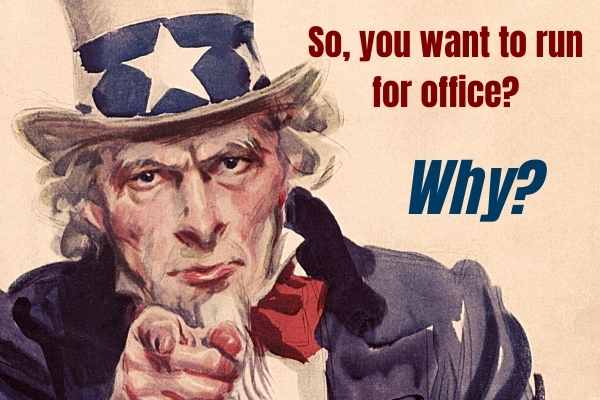Every two years in the United States, over 500,000 public offices are up for election. During that time, more than a million and a half candidates will seek elected office. For many of these candidates, it will be their first race.
If you’re thinking about running for office this year, you’re not alone. But preparation is essential. Many first-time political candidates find the process overwhelming. This FAQ covers the most common questions about how to run for office—and win.
- How do I win an election?
- What are some good reasons to run for elected office?
- What political office should I run for?
- What are the requirements to run for office?
- When should I fill out my candidacy application?
- How much money will I need to raise to win my election?
- How can I raise money for my campaign?
- How do you create a political campaign strategy?
- What positions are needed for a campaign team?
- How many votes do I need to win an election?
- What is a good campaign slogan?
- What are ways to get your message out to voters?
- How can I leverage online advertising for my political campaign?
- What is GOTV?
- What will surprise me most about running for office?
- What happens when I win my election?
- What happens if I lose my election?
I want to run for political office. How do I win an election?
Let’s get to the most common question: How do I win an election?
Winning an election comes down to this: persuasive, repetitive communication with people who are likely to vote for you. You need to find your supporters—and get them to the polls.
It doesn’t matter if you are running for local town board or a county, state or federal office, basic campaigning steps and techniques apply.
What are some good reasons to run for elected office?
Running for office is a big step. It’s not enough to be qualified or interested in the job. There are many reasons why someone may want to run for elected office, but the best reasons are usually rooted in service and community improvement.
Positive motivations to seek office include:
-
A strong desire to make long-term changes for social justice
-
The belief that you can make a difference in your community
-
Personal growth through public service
-
A desire to shape public policy for the better
Regardless of your reasons for seeking elected office, you should have your reasons ready for public discussion. All candidates should have a quick elevator speech to explain, “I’m running for office because…” or “I want to run for local office in order to…”
Related: Should You Make The Run For Local Office?

What political office should I run for? Here’s what you need to know
Choosing the right political office to run for depends on your goals, skills, and chances of success.
- Most elected offices in the United States are at the local level. There are plenty of positions choose from. Local elected offices include town, village, county and city councils, school board members, water districts, ward alderman, county treasurers and clerks. Then there are state and federal positions, like state representative and congress.
- Some candidates choose an office because they feel they can win it. Just because you can win a race does not mean you will like the job, particularly if you do not have a clear motivation for seeking it.
- Running for a less competitive office can improve your chances of victory. It can also provide experience for a better position later. It’s better to compete in a race you can win, rather than choosing an office that you have little chance of winning. Don’t run to lose.
- Before you decide what position to pursue, you should know its roles and responsibilities. The office you run for should relate to the reason why you are seeking public office in the first place.
One way to approach the question is to consider your own skill sets and determine what office best suits your talents. If you have law enforcement experience, running for sheriff might be a good fit. If you are an engineer, perhaps you might want to seek a water commissioner position.
Related: What Are Easiest Political Offices To Run For?
What are the requirements to run for office?
The requirements to run for office vary by state and position.
Common requirements include:
- Being a minimum age (often 18 years old)
- Being a registered voter
- Residency in the district or area you wish to represent
- U.S. citizenship
Examples of age and other requirements:
- U.S. Senator: At least 30 years old, a citizen for 9 years, and a resident of the state.
- U.S. President or Vice President: At least 35 years old, a natural-born citizen, and a U.S. resident for at least 14 years.
Additional qualifications (depending on the office):
- Judge: May require an undergraduate or law degree.
- Sheriff: May require law enforcement certification and a background check.
- School board member: Typically a district resident and registered voter.
Visit your Secretary of State or county election website for specific requirements in your area. They include leadership training, campaign resources and checklists describing the necessary requirements to start and run a campaign. These helpful organizations include the League of Women Voters, Vote Run Lead and many more.
Related: Political Candidate Training Courses and Programs
When should I fill out my candidacy application?
Filing your application for candidacy is straightforward, but there are important rules to follow.
Steps to apply:
- Confirm you meet the qualifications for the office.
- File your paperwork before the deadline. These dates are listed on your Secretary of State (or governing body) website.
- Pay any required fees.
- Submit petitions with the required number of valid signatures (if applicable).
Some filings go to your Secretary of State; others go to your local election district or county.
Filing deadlines are non-negotiable. Missing them means you won’t appear on the ballot.
How much money will I need to raise to win my election?
The short answer: You will need to raise more money for your campaign than you probably think.
Seriously, though, the best to figure out how much money you will need to raise is to research what other campaigns for the same or similar office have spent in your area.
In the U.S., most local offices require a budget of 20 to 25 thousand dollars. This money is spent on campaigns signs, advertising, public events and fundraisers and maybe a few part-time staff.
For statewide or federal races, the budgets run into the hundreds of thousands to millions of dollars. You’ll need a pair staff for communications and legal compliance. Your advertising budget will be much larger, as well.
Be sure to review relevant campaign finance laws and regulations so you know how much you can legally raise and how you can legally spend your campaign funds. You can get initial campaign finance information from your Secretary of State website.
Related: How Much Should Your Political Campaign Budget For Digital?
How can I raise money for my campaign?
In the United States, you will have to spend some amount of money on political activity to win an election. If you cannot afford to self-finance your own campaign, then you will have to raise money from others.
You will need a bank account for your campaign in order to collect donations. This account must be in your campaign’s name, and not a personal bank account.
Be sure to keep detailed records of all donations and expenses. At some point, you will need to declare that information. You will want to hang on to those records even after the election.
Fundraising is an important part of campaigning. Reach out to your political party to see if they can offer financial assistance. Even if they cannot provide money, they may be able to point you into the right direction as far as donors and potential resources.
Check how much was spent on previous elections for your desired office. Your budget for campaign signs, literature, campaign staff and travel should also be factored to determine how much money you will need to raise.
Common political fundraising methods include:
- Fundraising Letters
- Telephone Requests
- Holding Fundraising Events
- Accepting Donations Online
- Email Marketing
- Door-to-Door
- Text to Give
Start your political fundraising campaign as soon as you can. In many cases, you can start to raise funds before you announce your intention to run for office. This will help pay for initial campaign expenses.
Be cautious with your fundraising budget. Don’t overspend on fundraising efforts that fail to cover their costs.
Related: How Candidates Raise Money For Local Campaigns

How do you create a political campaign strategy?
The first step in creating a political campaign strategy is to define your audience. Who will you be targeting?
This will help you create an effective strategy because now you know who your message is for and how it needs to resonate with them.
The next step is finding out what they care about most, their cultural beliefs, economic status, etc. You need to find out what’s important for them so that your message is tailored towards them and resonates with them specifically.
Every campaign requires a unique strategy for victory. Most candidates will write out a political campaign plan before they decide to run for office. You may want to work with others in creating this plan. Your own campaign strategy will depend several factors. They include the size of the electorate, the locality, the issues at play, the voter outreach methods and the general timeline of the election season.
A strategic summary encapsulates your campaign’s goals. Yes, it’s to win the election, of course. But you can also expand this summary to include the broad strokes of the actions that your organization will take. It should include a general overview of why you are running and what you plant to do if elected.
You will also want to include your vote goal, locations and/or voter types you wish to specifically target. If you are in a primary, you will want to take your opposition into account along with potential challengers.
What type of media exposure do you expect to gain? What are your plans for coverage by local media? Who will speak with and handle reporters? What paid media will you use – and how much will it cost? How do you plan to use television, radio and online channels?
Your timeline is very important. This where you lay out the campaign calendar. You will need to decide when you announce your campaign, when events and fundraisers are held, when press releases are scheduled, when you will start spending money on media and your GOTV efforts.
A solid campaign strategy is detailed yet flexible. Expect things to change and adjust your plans as needed.
Related: Creating an Online Campaigning Plan

What positions are needed for a campaign team?
One of the first things to do when starting out is to create a political campaign committee. You will need a committee in place in order to legally accept donations and spend money on your campaign. Rules and requirements on establishing a committee vary from state to state. Your state election website and local county Board of Elections can provide you with information and the paperwork necessary to start your campaign committee.
Politics is a group effort. You need the right people and the right structure to make up your campaign team. Larger campaigns require a more extensive team, but even a small campaign requires a campaign manager, fundraising manager and treasurer.
- Campaign Manager: The role of campaign manager is critically important. A campaign manager takes the lead on everything related to your campaign and acts as the primary contact between the candidate, the staff and outside help. In small campaigns, they are often the only paid staff member. A candidate should NOT act as his or her own campaign manager.
- Campaign Fundraiser: You need someone to responsible to raise money. A campaign fundraiser or finance director is responsible for keeping the candidate on track with fundraising efforts and overseeing fundraising events. A campaign fundraiser must be well-organized, outgoing and willing to push hard to meet their goals.
- Campaign Treasurer: The campaign treasurer oversees the campaign’s financial and accounting operations. They approve expenditures and help with maintaining the budget. They also track contributions, maintain financial records and are responsible for compliance with the relevant election board. Whoever you pick for this position should be highly responsible and have experience in accounting or finance.
Additional helpful roles:
- Volunteer Coordinator: This is someone who can manage volunteers and keep multiple activities running smoothly. This should be someone who can work well with people and keep the volunteers organized.
- Field Director: This person oversees the operations that gets the campaign message out through direct voter contact. This includes door-to-door canvassing and managing phone banks. They may also organize voter registration efforts and final GOTV operations.
- Political Consultants: While paid consultants are usually used in larger campaigns, you may decide that you want to hire consultants for specific tasks. They often have expertise in political strategy, advertising efforts (digital, mail, television), field operations and more.
Choose team members who are reliable, skilled, and aligned with your campaign goals.
How many votes do I need to win?
This is a question you should have figured out right at the beginning of your campaign. You need to know early how many votes you require, and you need to know where those votes will come from. To win a local election, you need a majority of the votes cast.
Basically, the winning formula is:
Expected Vote x .50 + 1 vote = Minimum Votes to Win (50%)
Expected Vote x .52 = Comfortable Margin of Victory (52%)
For more accurate numbers:
- Review past election results in your district.
- Factor in expected voter turnout and any demographic shifts.
Here is more information on determining the votes you need for election victory.
What is a good campaign slogan?
It doesn’t matter if what you are running for, be it mayor, county sheriff, town, or state legislature – your campaign should have a slogan. Campaign slogans summarize the essence of your race in a single phrase.
Tips for creating a strong slogan:
-
Keep it short (3-5 words is ideal)
-
Reflect your campaign values and personality
-
Make it positive and future-focused
-
Easy to remember and repeat
What are ways to get your message out to voters?
You can try to get your message out to voters by using traditional media, such as newspapers and television. Political advertising has a long a varied history. You’ll have a lot of competition to get voter’s attention during election season. The major communication mediums include:
- Campaign literature. This includes brochures, flyers, door hangers and other print materials that are used for direct mailings.
- Campaign signs are another traditional advertising method. Lawn signs help build name recognition for candidates.
- Other paid media coverage. There are many channels available for this purpose. Newspaper advertising is still a popular medium. Television and radio advertising are common but are typically reserved for campaigns with larger budgets. Other affordable advertising channels include digital advertising.
Virtually all political advertising requires a disclosure statement stating who is responsible for the content of the ad. These rules vary by state.
How can I leverage digital advertising for my political campaign?
There are many ways for political candidates to promote their campaigns online. A campaign website and social media (primarily Facebook and Twitter) are the most common promotional platforms.
Most online advertising is of the paid type. If you are looking for any real exposure, you will need to spend money. The most common methods of promotion include:
Social media platforms and search engines are demanding more transparency and verification from political advertisers. If you plan to advertise on a certain platform, make sure you know what information is required to become authorized. Give yourself enough time to become properly verified.
Related: How Much Should Your Campaign Budget For Digital Advertising?
What is GOTV?
Get Out the Vote (GOTV) is an organized effort by a political party or campaign to encourage citizens to vote during an election. It is also a term that can be used to describe any of these three facets of electoral politics:
- Non-partisan efforts to increase voter turnout, as with voter registration drives and voter education.
- Campaigns by political parties, candidates or supporters to encourage or help voters cast their ballots for a particular party, candidate or ballot measure.
- Coordinated campaigns among multiple groups, often on a state level, aimed at influencing the outcome of elections.
GOTV focuses on turning out voters who are considered likely supporters by using reminders about voting deadlines, emphasizing how important their vote is, and/or applying pressure through fear tactics. An effective get out the vote strategy can mean the difference between victory and defeat, especially in close races.
What will surprise me most about running for office?
Expect negativity—and be ready for it.
Campaigns can get nasty, and you’ll need a thick skin. If you have any skeletons in your closet, assume they’ll come out.
Other surprises:
- How much time campaigning consumes
- The pressure on your family and personal life
- How quickly things move as Election Day approaches. Here are a few other things you might want to know.
What happens when I win my election?
Congratulations on your electoral victory! Your hard work paid off, and now you can represent your constituents. Here is some advice on what to do next:
- Thank the people who helped make your victory possible. This includes staff, volunteers, donors, friends, family and organizations. Thank them in writing or in person. Thank your voters with a message on your campaign website and social media accounts.
- Pay off your campaign debts. If your campaign owes money to vendors or consultants, put together a plan to pay them off quickly.
- Wrap up your campaign. Organize and archive your campaign materials. This includes your lists of donors, vendors, volunteers and supporters. These are valuable materials that can help you in your next election – or help another candidate or organization. You’ll need to decide how best this information will be used.
- Get the signs down! You should have this done ASAP. If you don’t take your signs down quickly enough after Election Day, your campaign may be fined for violations.
- Step into your new role. After your swearing in, you will have the job you fought so hard to get. Now it’s time to work on the issues achieve the goals that made you seek the office in the first place.
Good luck!
What happens if I lose my election?
Unfortunately, not everyone can win their election. After all the endless activity of campaigning, the sudden stop can be jarring.
There are a few things you’ll need to do to wrap things up. First, thank your staff and supporters. Without them, you would have never gone as far as you did.
Again, signs need to come down – quickly. You’ll also need to wrap up any campaign paperwork and settle debts. This can be difficult, particularly if you have financially invested your money into the campaign.
While it can be difficult to let things go, you will have to pick yourself up and move on. Coming to terms with loss will take some time. You may decide that you are done with politics, or you may channel your energy and experience into other positive community action.
Online Candidate provides political campaign websites and marketing services. Find out how we can help you.
« Three Essential Political Website DisclaimersSchool Board Campaign Logo Design »
Tags: local campaigns














